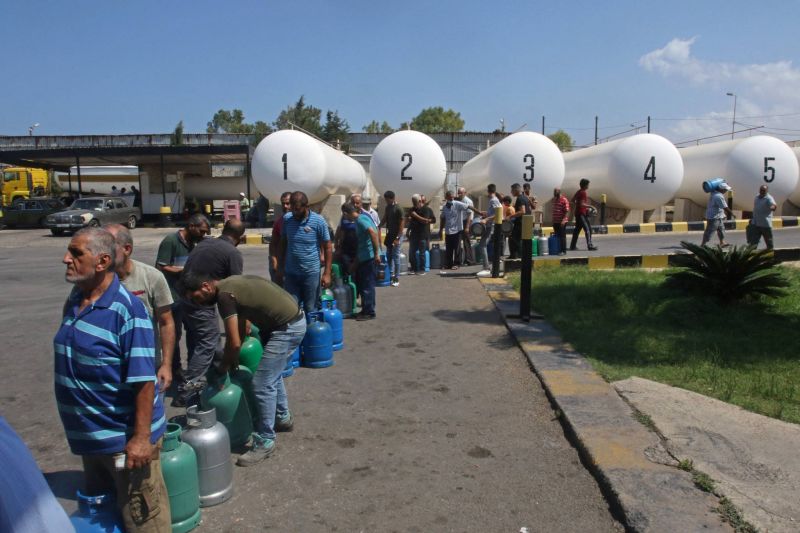
Residents queue to fill cooking gas canisters on Tuesday in Saida. (Credit: Mahmoud Zayyat/AFP)
Want to get the Morning Brief by email? Click here to sign up.
The official price of fuel rose again, after shortages caused lines at gas stations and even at cooking gas distribution points. Prices of gasoline and diesel increased by about 2.5 percent, with 20 liters of 95-octane gas now costing LL77,500, while the price of cooking gas rose nearly 4 percent to LL58,800. Yesterday, people queued in Saida, Zahrani and Akkar amid warnings that cooking gas would become the latest staple item to face shortages. One gas supplier told L’Orient Today that importing companies are not providing him and his colleagues with their gas needs, adding that “we are still selling gas at the official rate.” Gasoline stations also witnessed longer lines, again snarling traffic in the capital as long queues spilled out onto streets, as diesel shortages cast many into darkness, with many generator operators unable to buy fuel. The head of the petroleum importers’ association, George Fayad, told L’Orient Today that two diesel ships are coming to Lebanon this week, adding that “there is no agreement with Banque du Liban on importing more diesel, gasoline or gas anytime soon.”
The company that supplies the bulk of serum used in hospitals narrowly averted closure after receiving enough diesel to operate for two more days. Sleiman Haroun, the head of the private hospitals’ syndicate, said the closure of Alfa Laboratories, which provides 70 percent of hospitals’ needs, would endanger the lives of many patients in the country. Two days ago, private hospitals warned that shortages of diesel might force them to shut down, before another last-minute intervention from the syndicate and the Energy Ministry saved the day. But the two entities were only able to secure enough diesel to run 10 hospitals for two days.
Parliament’s health committee voted to approve “emergency imports” of medicines, but under certain conditions. This plan previously raised fears over the quality of drugs introduced to Lebanon, but the head of committee, Assem Araji, said, “We accept the urgent importation of drugs, depending on market needs and on condition that the quality of the products is approved in the country of origin and validated by the World Health Organization.” Lebanon is suffering from serious shortages of drugs and medical equipment, in addition to diesel needed to run generators. The current shortages are threatening the health of the Lebanese people, added Araji, deploring that medications for chronic and cancerous diseases are now absent from the market.
Over half of migrant workers in Lebanon need urgent humanitarian assistance, a UN body said. Some 120,000 of the country’s 210,000 migrant workers are unable to secure basic food needs, pay rent or even get health care, the International Organization for Migration said. Mathieu Luciano, the head of the IOM in Lebanon, warned that “many are so desperate that they want to leave the country, but they do not have the means to do so.” To help address the issue, the UN launched an appeal on Monday to support 1.1 million Lebanese and migrants, while Tuesday marked the launch of the IOM and UN agencies’ Emergency Response Plan to mobilize $378.5 million for the target groups, the IOM said.
Hezbollah confirmed that four of its fighters involved in Friday’s weapons fire at the southern border had been released, and their rocket-launching truck had been handed back. The four had been arrested by the Lebanese Army after residents of Shwaya, in the southern district of Hasbaya, stopped their vehicle as it left a nearby launch site. A Hezbollah spokesperson told L’Orient Today that the four were released, and the truck they used to launch the missiles had been given back to the party. An army spokesperson said that the four were released following a judge’s order, but could not confirm that the rocket launcher had been returned. The rocket fire came in response to Israeli airstrikes late Wednesday night — the first such confirmed strikes in Lebanon since 2014.
